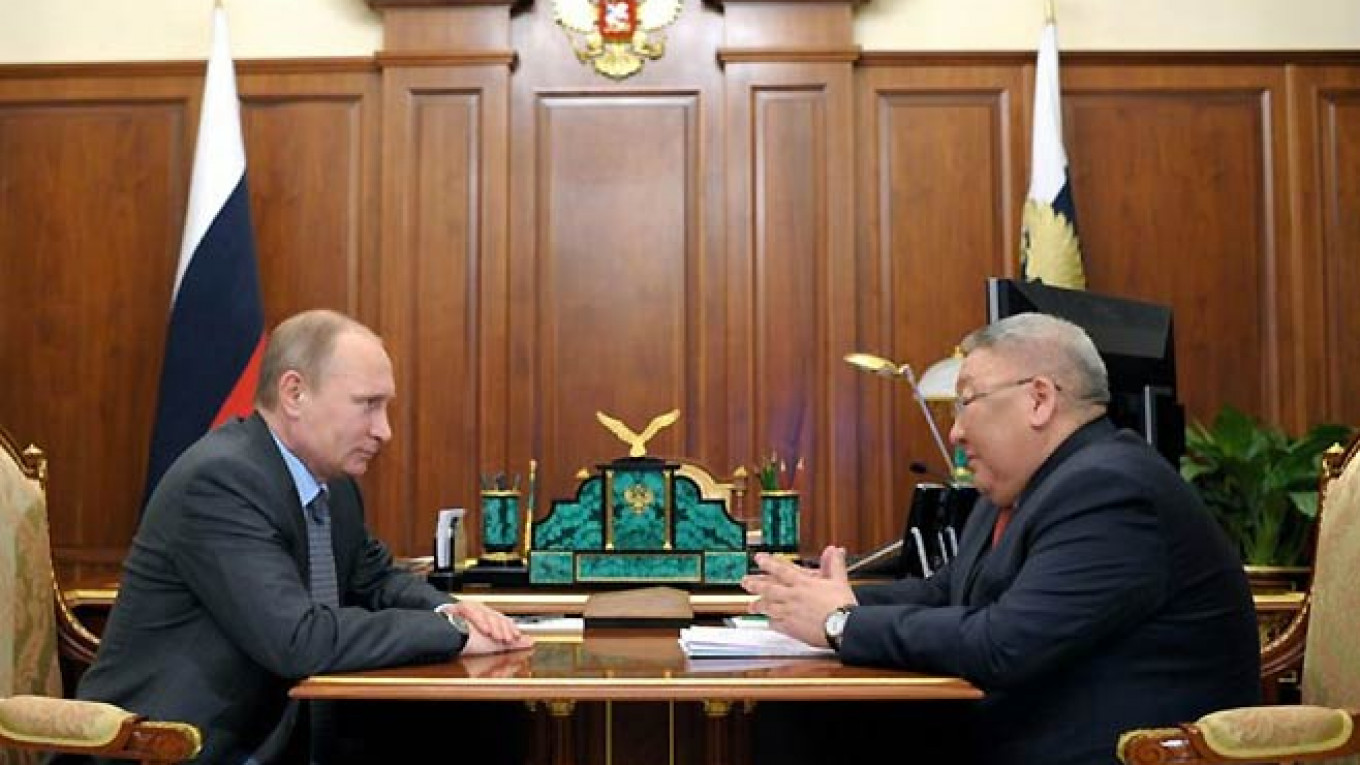President Vladimir Putin's dismissal of republic of Sakha head Yegor Borisov on Tuesday marked the 13th governor to be dismissed since the start of this year, a trend analysts say means the Kremlin is effectively rolling back its 2012 reintroduction of gubernatorial elections.
The list of subjects that have seen their heads dismissed since Jan. 1 now includes the republic of Sakha, the republic of Komi, the republic of Altai, the Yamal-Nenets autonomous region, and the Volgograd, Novosibirsk, Pskov, Orlov, Udmurtia, Voronezh, Kurgan, Kirov and Chelyabinsk regions, though some governors were subsequently reappointed.
Political analysts view the wave of dismissals as a return to the earlier system of the Kremlin appointing governors. That system was in place until direct gubernatorial elections were reinstated in early 2012, a reform thought to have been prompted by mass street protests against alleged fraud in the 2011 State Duma elections.
According to Nikolai Petrov, a professor at the Higher School of Economics specializing in regional politics, the spate of recent firings represents a "refusal to modernize," and is a clear sign of the Kremlin strategically replacing governors ahead of elections set for September.
"The most important criteria is loyalty [to the Kremlin] and not effectiveness," he said.
While some of the dismissed governors had reached the end of their terms and others were temporarily reappointed to their positions, more than a third of the dismissals prematurely ended the terms of politicians who were not scheduled for re-election this year, and eight of the governors were replaced with new acting heads expected to try to renew their mandate this fall.
The governors' replacements are those who are expected to be loyal to the Kremlin. While some newly named governors like Novosibirsk's Vladimir Gorodetsky were plucked from local government ranks, others like the Volgograd region's new leader Andrei Bocharov and the Orlov region's Vadim Potomsky had occupied federal offices and lived in other areas of the country before being placed in governing positions.
"It is plain to see that this is the Kremlin liquidating what it had previously given back to voters in the direct election of governors. We see that if the Kremlin wants to change a governor, they change him before the elections," Petrov said.
Political analyst Yury Kolgunyuk said that he saw in the recent dismissals a return to the 2000s, when Putin's power vertical, governors, played the role of place keepers for Putin in these regions" and could easily be dismissed if they lost the trust of the president.
Governors in regions such as the republic of Sakha and Chelyabinsk are being replaced long before the end of their terms, meaning that several gubernatorial elections set for this year have been moved up by a year or more.
Petrov said such early regional elections may also be advantageous for the Kremlin.
"If you give the heads of regions until the end of their terms," he said, "then too many heads will be re-elected in 2015 and 2016" when federal authorities will be busying themselves with campaigns for the State Duma elections, the first after 2011's controversial vote.
A Just Russia's head Sergei Mironov told news site KazanFirst late last month that "somehow acting governors have come en masse … There is a sense that the authorities are clearing [the political field] to have these acting governors re-elected" in place of those who were ousted.
Contact the author at c.brennan@imedia.ru
A Message from The Moscow Times:
Dear readers,
We are facing unprecedented challenges. Russia's Prosecutor General's Office has designated The Moscow Times as an "undesirable" organization, criminalizing our work and putting our staff at risk of prosecution. This follows our earlier unjust labeling as a "foreign agent."
These actions are direct attempts to silence independent journalism in Russia. The authorities claim our work "discredits the decisions of the Russian leadership." We see things differently: we strive to provide accurate, unbiased reporting on Russia.
We, the journalists of The Moscow Times, refuse to be silenced. But to continue our work, we need your help.
Your support, no matter how small, makes a world of difference. If you can, please support us monthly starting from just $2. It's quick to set up, and every contribution makes a significant impact.
By supporting The Moscow Times, you're defending open, independent journalism in the face of repression. Thank you for standing with us.
Remind me later.






